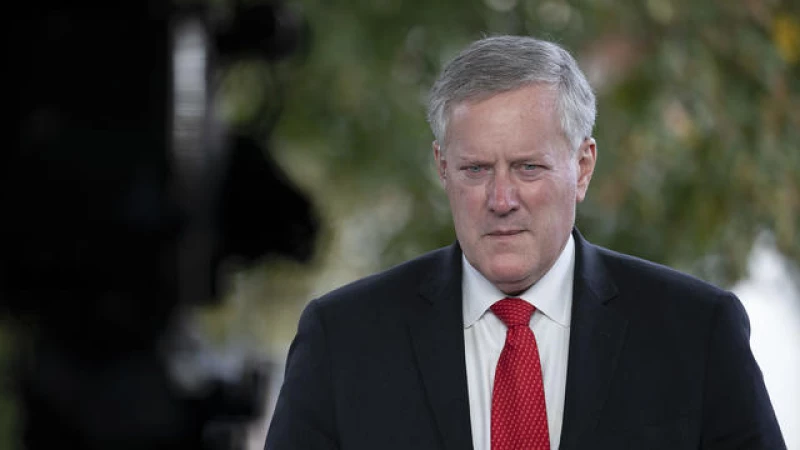A recent ruling by the 11th Circuit U.S. Court of Appeals has implications for Mark Meadows' attempt to move the election interference charges against him in Georgia from state court to federal court.
The ruling, which came in October, centered around a Georgia man who claims to be an heir to the Moroccan kingdom. It raised the question of whether a statute that applies to federal officials also extends to former federal officials, like Meadows. Specifically, it questioned whether Meadows can still invoke the Federal Officer Removal Statute now that he is no longer a federal officer.
The Federal Officer Removal Statute, which has been in place for 234 years, allows federal officials charged with state crimes to transfer their cases to federal court if they are related to their official duties.
Appeals Court Hears Oral Arguments in Meadows' Case
A three-judge panel of federal appeals court judges heard oral arguments over the jurisdiction of Meadows' case on Friday. Meadows, who was White House chief of staff under former President Donald Trump, was charged in Fulton County, Georgia — along with Trump and 17 others — with conspiring to overturn Trump's 2020 election loss. Four of those charged have already agreed to cooperate, including two lawyers involved with the effort, Sidney Powell and Kenneth Chesebro, and a bail bondsman named Scott Hall, who entered guilty pleas. Trump, Meadows and others have denied wrongdoing.
Meadows argues that his case should be moved to federal court because he was a federal official when the alleged criminal conduct occurred, and he was acting within the scope of his duties as a federal officer at the time.
The three-judge panel, appointed by Presidents George W. Bush, Barack Obama, and Joe Biden, asked pressing questions of both sides during the 40 minutes of arguments. They expressed skepticism about the arguments put forth by Meadows's attorney, including his assertion that the charges against Meadows could be dismissed under the federal immunity defense.
"According to [Meadows], it seems like everything was within his official duties. And that just cannot be right," said Judge Robin Rosenbaum during the proceeding.
The appeal from Meadows comes after U.S. District Judge Stephen C. Jones denied his request to move the case to federal court, siding with prosecutors who contended the evidence "established that the actions at the heart of the state's charges were taken on behalf of the Trump campaign with the goal of affecting state election activities and procedures."
Prosecutor Donald Wakeford, from the office of Fulton County District Attorney Fani Willis, argued in the appeals proceeding that Meadows should not be allowed to transfer his case to federal court since he is no longer a federal officer.
Judge William H. Pryor pointed out that there may be a valid reason for removal to federal court when dealing with a current officer, as it involves the ongoing operations of the federal government.
"However, this heightened concern might not be applicable when dealing with a former officer, as it does not involve the ongoing operations of the government," he stated.
Nevertheless, the judges expressed worries about the potential "chilling effect" that keeping the case in state court could have.
"Wouldn't this create a chilling effect on individuals considering running for office, as well as those currently in office? They may think twice about their actions, fearing future indictment and the inability to have a trial in a federal setting," Judge Rosenbaum remarked.
All three judges on the panel were in the majority of the decision in October, which vacated the conviction of Timothy Pate, a man who described himself as the heir to the kingdom of Morocco. Pate had filed millions of dollars in liens against the properties of former and current IRS officials who he thought had wronged him. He was convicted of filing false retaliatory liens against federal officials, but he challenged the conviction by arguing that because two of the IRS officers were no longer federal employees when he filed the liens, he had not committed a federal crime. The 11th Circuit threw out Pate's convictions.
Just three days after issuing that ruling, the court ordered Meadows and the Fulton County District Attorney's office to file supplemental briefs on whether the court's analysis in Pate permits a "former" federal officer to remove a criminal prosecution from state to federal court. In essence, the precedent of Pate puts into question one of the key conditions for removal, which is whether Meadows can still be considered a federal official for the purposes of the statute.
Wakeford emphasized that the removal statute is meant to protect federal authority, yet "ultimately, this is a case where, once again, there is no federal authority to protect."
No ruling has been issued on the appeal. Four other defendants in the Fulton County racketeering case are also seeking to have their cases moved to federal courts and have appeals pending in the 11th Circuit.







